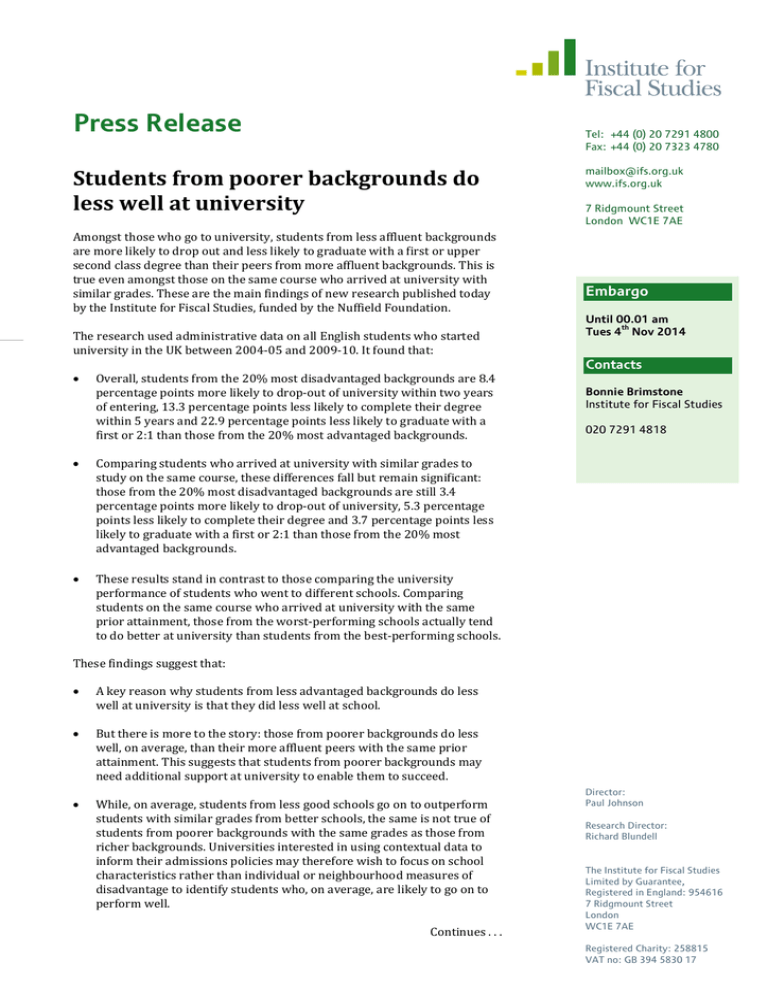Press Release Students from poorer backgrounds do less well at university
advertisement

Press Release Tel: +44 (0) 20 7291 4800 Fax: +44 (0) 20 7323 4780 Students from poorer backgrounds do less well at university Amongst those who go to university, students from less affluent backgrounds are more likely to drop out and less likely to graduate with a first or upper second class degree than their peers from more affluent backgrounds. This is true even amongst those on the same course who arrived at university with similar grades. These are the main findings of new research published today by the Institute for Fiscal Studies, funded by the Nuffield Foundation. The research used administrative data on all English students who started university in the UK between 2004-05 and 2009-10. It found that: • • • Overall, students from the 20% most disadvantaged backgrounds are 8.4 percentage points more likely to drop-out of university within two years of entering, 13.3 percentage points less likely to complete their degree within 5 years and 22.9 percentage points less likely to graduate with a first or 2:1 than those from the 20% most advantaged backgrounds. mailbox@ifs.org.uk www.ifs.org.uk 7 Ridgmount Street London WC1E 7AE Embargo Until 00.01 am Tues 4th Nov 2014 Contacts Bonnie Brimstone Institute for Fiscal Studies 020 7291 4818 Comparing students who arrived at university with similar grades to study on the same course, these differences fall but remain significant: those from the 20% most disadvantaged backgrounds are still 3.4 percentage points more likely to drop-out of university, 5.3 percentage points less likely to complete their degree and 3.7 percentage points less likely to graduate with a first or 2:1 than those from the 20% most advantaged backgrounds. These results stand in contrast to those comparing the university performance of students who went to different schools. Comparing students on the same course who arrived at university with the same prior attainment, those from the worst-performing schools actually tend to do better at university than students from the best-performing schools. These findings suggest that: • • • A key reason why students from less advantaged backgrounds do less well at university is that they did less well at school. But there is more to the story: those from poorer backgrounds do less well, on average, than their more affluent peers with the same prior attainment. This suggests that students from poorer backgrounds may need additional support at university to enable them to succeed. While, on average, students from less good schools go on to outperform students with similar grades from better schools, the same is not true of students from poorer backgrounds with the same grades as those from richer backgrounds. Universities interested in using contextual data to inform their admissions policies may therefore wish to focus on school characteristics rather than individual or neighbourhood measures of disadvantage to identify students who, on average, are likely to go on to perform well. Continues . . . Director: Paul Johnson Research Director: Richard Blundell The Institute for Fiscal Studies Limited by Guarantee, Registered in England: 954616 7 Ridgmount Street London WC1E 7AE Registered Charity: 258815 VAT no: GB 394 5830 17 Commenting on the research, Dr Claire Crawford, University of Warwick and the Institute for Fiscal Studies (IFS), said: “Our research highlights that there are large differences in university outcomes by socio-economic background, a substantial proportion of which can be explained by differences in attainment earlier in the education system. While improving the attainment of students from disadvantaged backgrounds at school is likely to aid their performance at university as well, we find nonnegligible differences in university outcomes between students from different socio-economic backgrounds at the same university, studying the same subject, who arrived with the same grades. This suggests that universities may wish to focus on improving the progression and performance of students from disadvantaged backgrounds as well as widening access.” ENDS Notes to Editors: 1. This PR summarises the results of a new research paper entitled “Socioeconomic differences in university outcomes in the UK: drop-out, degree completion and degree class” by Dr Claire Crawford (Assistant Professor of Economics at the University of Warwick and Research Fellow at the IFS). For embargoed copies of the paper or other queries, contact: Bonnie Brimstone on 020 7291 4818 or bonnie_b@ifs.org.uk. 2. The research is based on administrative data which enables us to follow pupils attending schools in England into any university in the UK (the NPD-HESA data), covering around 200,000 university entrants per year. We focus on dropout within two years of entering university to study any qualification, degree completion within five years of entering university amongst those studying fulltime for a first degree, and – amongst those studying full=time for a first degree who complete their degree – whether they graduate with a first or upper second class (2:1) degree. Medics are excluded from the analysis of degree completion and degree class, because their degrees take longer than average to complete and because they are not generally awarded a degree class. The measure of socio-economic status used in the paper is based on a combination of eligibility for free school meals at age 16 and a series of local neighbourhood measures of disadvantage, including the Index of Multiple Deprivation. 3. The authors gratefully acknowledge funding from the Nuffield Foundation, who have provided generous support for our research via the project “Higher education funding and access: exploring common beliefs”. The Nuffield Foundation is an endowed charitable trust that aims to improve social wellbeing in the widest sense. It funds research and innovation in education and social policy and also works to build capacity in education, science and social science research. The Nuffield Foundation has funded this project, but the views expressed are those of the authors and not necessarily those of the Foundation. More information is available at http://www.nuffieldfoundation.org. IFS hosts the ESRC Centre for the Microeconomic Analysis of Public Policy (CPP) The Institute for Fiscal Studies Limited by Guarantee, Registered in England: 954616 7 Ridgmount Street London WC1E 7AE







